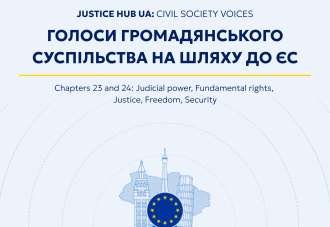On April 9, the first meeting of the working subgroup on assessing the risks of abuse of the NPO sector for money laundering and terrorist financing (ML/TF) took place. This subgroup was established on February 28 of this year, in line with the updated 2024 Methodology for Conducting the National Risk Assessment (NRA), approved by the Council for Preventing and Counteracting the Legalization (Laundering) of the Proceeds of Crime, Terrorist Financing, and the Financing of the Proliferation of Weapons of Mass Destruction on December 26, 2024.
The meeting brought together representatives of the State Financial Monitoring Service of Ukraine, the Ministry of Finance of Ukraine, the National Bank of Ukraine, the Ministry of Justice of Ukraine, the National Securities and Stock Market Commission, the State Tax Service of Ukraine, and the Office of the Prosecutor General. For the first time in the history of the NRA process, civil society actors also joined the discussion — among them, the Centre for Democracy and Rule of Law, Caritas Ukraine, the Centre of Policy and Legal Reform, Tabletochki Charity Foundation, the Centre for Financial Integrity, the Ilko Kucheriv Democratic Initiatives Foundation, the Ukrainian Helsinki Human Rights Union, and Transparency International Ukraine.
Constructive Meeting Sets the Stage for Data Collection in the NPO Sector Risk Assessment Process
The meeting proceeded constructively, officially launching the process of collecting the information and data needed to analyze and assess the risks of abuse of the NPO sector for money laundering and terrorist financing (ML/TF). This phase will run through the end of June. Some of the data will be drawn from the 2024 Independent NPO Sector Risk Assessment Report prepared by CEDEM.
A noteworthy innovation introduced in this round of the NRA is a refined approach to data collection: group members will now provide information specifically identifying threats and vulnerabilities inherent to the sector. This will help ensure a clearer and more evidence-based risk and impact assessment.
The working subgroup also agreed on the classification of NPO types to be evaluated. In this round, the lists will differ for ML and TF assessments. For ML purposes, all types of NPOs will be analyzed. For TF risk, however — in line with FATF Recommendation 8 — the focus will be limited to public associations, charitable and religious organizations, unions, and creative unions.
In this context, CEDEM proposed excluding trade unions from the TF risk assessment list, arguing they do not fall under the FATF’s definition of NPOs — a position supported by the FATF Best Practices Paper 2023 and World Bank recommendations. This proposal is currently under review by the working subgroup.
Another key outcome of the meeting was the development of a unified approach to applying the provisions of the updated NRA Methodology.
Several critical principles were underscored during the meeting:
- The assertion that the absence of data necessarily signals heightened risk — particularly if it points to a vulnerability in the NPO sector within the AML/CFT/CPF* system — should not be applied unconditionally. A conclusion of higher risk must be based on sound justification.
- The provisions of the NRA Methodology regarding risk assessment factors, as well as indicators of vulnerabilities and threats related to the abuse of the NPO sector for ML/TF, should be viewed as tools for evaluation — not as final conclusions in and of themselves. Decisions related to these factors must be grounded in thorough reasoning.
- A proper ML/TF risk assessment of the NPO sector should also take into account violations of tax legislation by NPOs, where such violations precede or are connected to ML/TF offenses.
It is also worth noting that the NRA process will not seek to establish a generalized risk level for the entire NPO sector — a decision fully aligned with FATF recommendations. Instead, specific risk levels will be determined for each distinct category of NPOs.
CEDEM extends its gratitude to the State Financial Monitoring Service of Ukraine for their constructive and fruitful cooperation in advancing the implementation of international best practices.
*AML – Anti-Money Laundering
CFT – Countering the Financing of Terrorism
CPF – Countering the Financing of the Proliferation of Weapons of Mass Destruction
